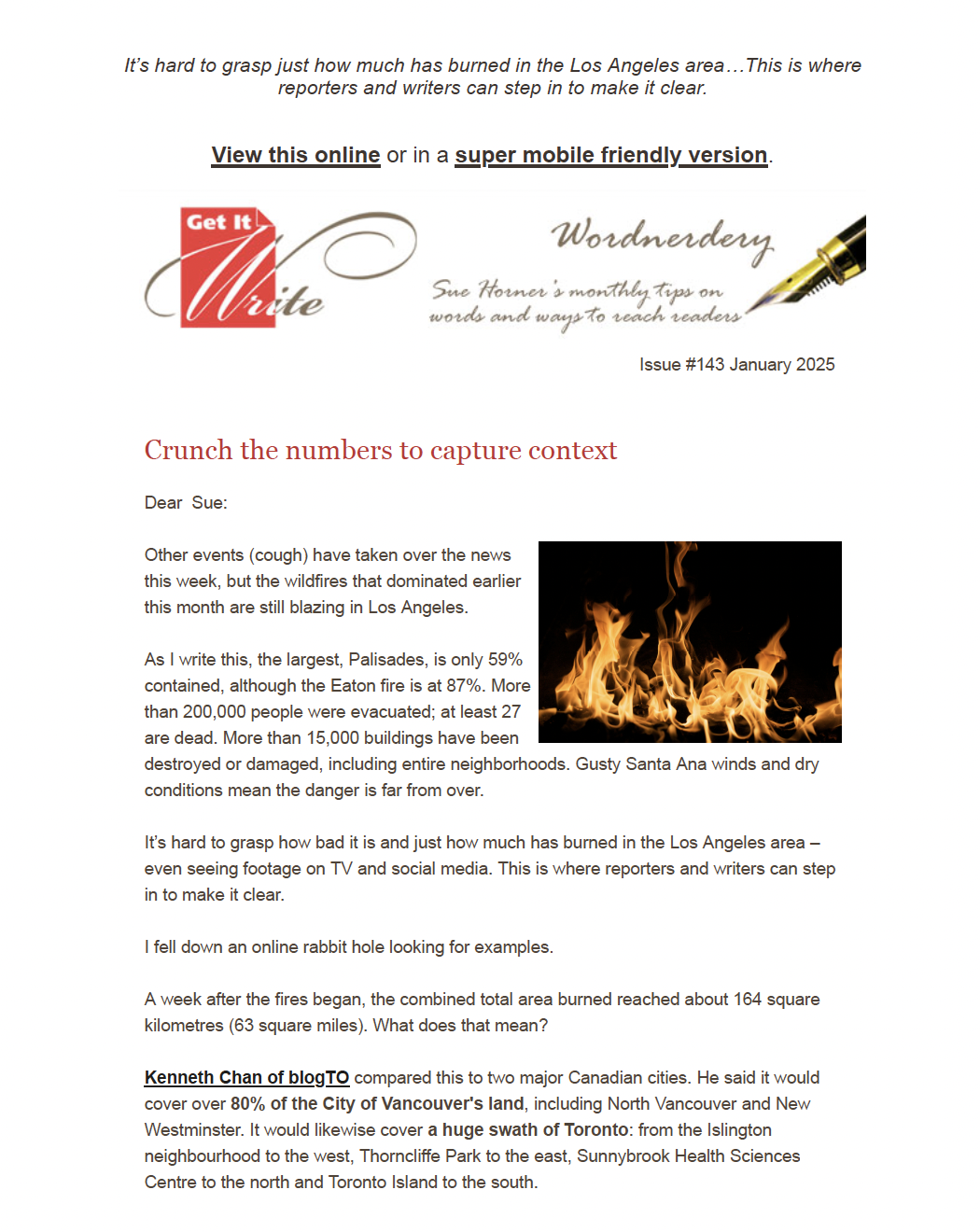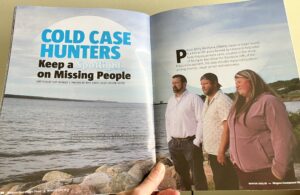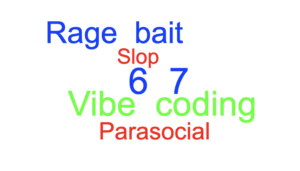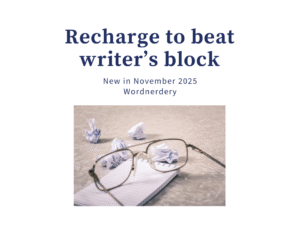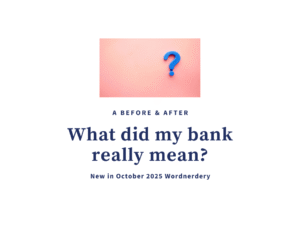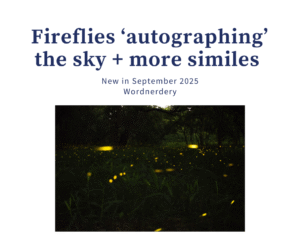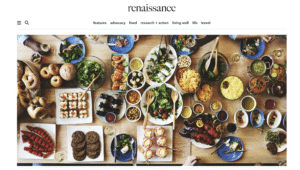Sue’s newsletter
Wordnerdery is a monthly newsletter with tips on writing, words, newsletters and more.
I’m thrilled that it has earned an APEX Award of Excellence for Electronic & Email Newsletters.
Don’t worry, your email address is safe with me! I never rent or share your information, and MailChimp also promises to keep all information safe. Read its privacy policy.
Past Issues
Issue 154 – December 2025: Wrapping Wordnerdery up in a bow
Issue 153 – November 2025: Recharge to beat writer’s block
Issue 152 – October 2025: What did my bank really mean? A before & after
Issue 151 – September 2025: Fireflies ‘autographing’ the sky and more striking similes
Issue 150 – August 2025: Making numbers make sense, Canadian version
Issue 149 – July 2025: Coldplay inspires wordplay and other shenanigans
Issue 148 – June 2025: An investor letter only a lawyer could love
Issue 147 – May 2025: 5 ways to use the power of words
Issue 146 – April 2025: 10 tips to focus and write faster without AI
Issue 145 – March 2025: Tariffs aren’t a Happy Meal + more analogies
Issue 144 – February 2025: Make your public notice readable (a Before & After)
Issue 143 – January 2025: Crunch the numbers to capture context
Issue 142 – December 2024: It’s a wrap for 2024
Issue 141 – November 2024: A look at the lyrical language of Taylor Swift
Issue 140 – October 2024: Inspire action with plain language alerts
Issue 139 – September 2024: Don’t make readers do the math! 4 ways to explain numbers
Issue 138 – August 2024: 7 steps to trim and tone flabby writing
Issue 137 – July 2024: An “aggressive stapler’ + more super similes
Issue 136 – June 2024; How comms pros can be more effective allies
Issue 135 – May 2024: Short words are a shortcut to understanding
Issue 134 – April 2024: Be clear to keep it confidential (a ‘Before & After’)
Issue 133 – March 2024: An Oscar class in context
Issue 132 – February 2024: A ‘turtle Fitbit’ and more marvellous metaphors
Issue 131 – January 2024: Making sense of long sentences (before & after)
Issue 130 – December 2023: Life lessons from my granddaughter
Issue 129 – November 2023: The poetic power of music in trying times
Issue 128 – October 2023: Plain language keeps it clear
Issue 127 – September 2023: What’s old is new again
Issue 126 – August 2023: A (Taylor) Swift look at numbers
Issue 125 – July 2023: Before & after: Dissecting a 5K waiver
Issue 124 – June 2023: Sharpies as a simile and more expressive writing
Issue 123 – May 2023: 5 ways to touch hearts by following the songwriter’s lead
Issue 122 – April 2023: Four minutes to weasel words
Issue 121 – March 2023: Don’t freak out about ChatGPT
Issue 120 – February 2023: ‘The brain’s Jiminy Cricket’ + more marvellous metaphors
Issue 119 – January 2023: Be kind and translate your Terms of Use
Issue 118 – December 2022: Christmas flashbacks to ‘life is short’ musings
Issue 117 – November 2022: Cut contract confusion (before & after)
Issue 116 – October 2022: How big are bears? Perspective makes it plain
Issue 115 – September 2022: Clear the way to better writing
Issue 114 – August 2022: Weasel words only get you in deeper trouble
Issue 113 – July 2022: Are companies embracing DEI?
Issue 112 – June 2022: Set the stage for effective employee announcements
Issue 111 – May 2022: An empty gas tank + more pandemic analogies
Issue 110 – April 2022: 5 ways to make environmental comms clear
Issue 109 – March 2022: Break the ‘Curse of Knowledge’
Issue 108 – February 2022: A ‘Post-it note’ for the brain + more analogies
Issue 107 – January 2022: Want feedback? Get to the point
Issue 106 – December 2021: 54 ways to be kind
Issue 105 – November 2021: How to set your survey up for success
Issue 104 – October 2021: How comms + PR people can make a difference to DEI
Issue 103 – September 2021: ‘Spaghetti on a plate’ + more pandemic analogies
Issue 102 – August 2021: 9 tips for writing bulleted lists
Issue 101 – July 2021: 5 ways to help make numbers make sense
Issue 100 – June 2021: Newsletters are back (or they never left)
Issue 99 – May 2021: Asking people to sign a release? Make it readable
Issue 98 – April 2021: Walking on Lego + more COVID-19 analogies
Issue 97 – March 2021: So what if you dangle your modifier?
Issue 96 – February 2021: It’s a Zoom world; warm up your words to match
Issue 95 – January 2021: #WFH means internal newsletters need to be more helpful in 2021
Issue 94 – December 2020: Apt analogies related to COVID-19
Issue 93 – November 2020: More comms that’s working during COVID-19
Issue 92 – October 2020: Comms during COVID-19: What’s working?
Issue 91 – September 2020: 5 lessons writers can learn from hiking the Bruce Trail
Issue 90 – August 2020: Reel in reader attention with captions that captivate
Issue 89 – July 2020: 34 ways to kick ‘unprecedented’ to the curb
Issue 88 – June 2020: 15 ways to get to the heart of headlines
Issue 87 – May 2020: 9+ tips to overcome imposter syndrome
Issue 86 – April 2020: How to make numbers make sense, COVID-19 edition
Issue 85 – March 2020: 4 strategies to communicate during social distancing
Issue 84 – February 2020: The inside view of comms, part 5 (member comms at RTO)
Issue 83 – January 2020: The ‘cooling power of a cat yawning’ and more metaphor magic
Issue 82 – December 2019: Life is short; eat the shortbread
Issue 81 – November 2019: Make ‘terms of service’ readable
Issue 80 – October 2019: CEO support fosters great internal comms
Issue 79 – September 2019: The inside view of employee comms, part 4 (with a look at PepsiCo Foods Canada)
Issue 78 – August 2019: Print’s not dead
Issue 77 – July 2019: The inside view of employee comms, part 3 (with a look inside Chartwell Retirement Residences)
Issue 76 – June 2019: The inside view of employee comms, part 2 (with best practices for e-newsletters)
Issue 75 – May 2019: The inside view of employee comms, part 1 (all about e-newsletters with Bananatag)
Issue 74 – April 2019: Words as Legos + more expressive language
Issue 73 – March 2019: 8 ways to make numbers meaningful
Issue 72 – February 2019: 8 reasons to keep e-newsletters in your comms toolbox
Issue 71 – January 2019: 8 ways to keep your New Year’s resolutions on track
Issue 70 – December 2018: Life is short: A Christmas reminder
Issue 69 – November 2018: Look for words that count people in
Issue 68 – October 2018: Think plain to make complex writing more readable
Issue 67 – September 2018: Cat’s + other apostrophe follies (for National Punctuation Day)
Issue 66 – August 2018: Feathers ‘soft as a whisper’ and more expressive writing
Issue 65 – July 2018: Let songwriters inspire your storytelling
Issue 64 – June 2018: Take steps to make legal statements readable
Issue 63 – May 2018: 9 ways to ace your endings
Issue 62 – April 2018: 3 ways to give numbers the context they need
Issue 61 – March 2018: Find your focus in the nut graf
Issue 60 – February 2018: Short attention span? Looks like a job for expressive writing
Issue 59 – January 2018: 8 ways to reel in your reader
Issue 58 – December 2017: Your “About” page is the place to get personal
Issue 57 – November 2017: Are you really explaining? Readability tests tell all
Issue 56 – October 2017: 10 tips for an effective non-profit newsletter
Issue 55 – September 2017: Citing Indigenous people? 10 ways to show respect
Issue 54 – August 2017: Hook your reader with compelling captions
Issue 53 – July 2017: 8 ways to get through the approval process
Issue 52 – June 2017: 5 reasons you should still embrace print
Issue 51 – May 2017: Employees need the inside scoop from leaders
Issue 50 – April 2017: How to keep your marketing e-newsletter in the spotlight
Issue 49 – March 2017: Take the dull out of digits
Issue 48 – February 2017: ‘Content as a Russian doll’ and more expressive writing
Issue 47 – January 2017: 7 ways to sabotage your employee e-newsletter
Issue 46 – December 2016: Let go of the stocking to live in the moment
Issue 45 – November 2016: Is Trump the new poster boy for plain language?
Issue 44 – October 2016: Interviews that get to the core of the story
Issue 43 – September 2016: How often to publish your employee newsletter
Issue 42 – August 2016: 4 steps to meaningful mission statements
Issue 41 – July 2016: 9 steps to readable writing
Issue 40 – June 2016: How to make numbers meaningful
Issue 39 – May 2016: Rhyme and rhythm: Musicians know how to write
Issue 38 – April 2016: 3 ways to spark interest with expressive writing
Issue 37 – March 2016: 7 deadly sins of e-newsletters
Issue 36 – February 2016: ‘Insight as a cat’ & more expressive writing
Issue 35 – January 2016: Jargon? Pin that Jell-O to the wall
Issue 34 – December 2015: How to make resolutions you’ll keep
Issue 33 – November 2015: 5 Pinterest pointers for small business
Issue 32 – October 2015: Frightened? Good, that’s one way to grow
Issue 31 – September 2015: 5 tips for saying you’re sorry
Issue 30 – August 2015: 7 tips for inclusive writing about disabilities
Issue 29 – July 2015: 7 steps to spin straw into gold
Issue 28 – June 2015: 7 tips for non-profit annual reports
Issue 27 – May 2015: Get an ‘aha’ moment with analogy
Issue 26 – April 2015: 4 ways to simplify your sustainability report
Issue 25 – March 2015: How to reach “non-desk” employees
Issue 24 – February 2015: Is print dead?
Issue 23 – January 2015: Why newsletters still have value
Issue 22 – December 2014: Linguistic cicadas, a six-car pileup of clichés and other expressive writing
Issue 21 – November 2104: Launching a newsletter? Here are some ideas on content.
Issue 20 – October 2014: Tips for writing for impatient readers (and aren’t we all?)
Issue 19 – September 2014: Tips for getting and using quotes
Issue 18 – August 2014: Don’t gas your readers with jargon monoxide
Issue 17 – July 2014: The expressive language of loss
Issue 16 – June 2014: What the new anti-spam law means for newsletters
Issue 15 – May 2014: Use plain language to boost readability
Issue 14 – April 2014: How often should you publish your newsletter?
Issue 13 – March 2014: ‘Dumpster diving in the Internet’ and other expressive writing
Issue 12 – February 2014: Do’s and don’ts for email newsletters
Issue 11 – January 2014: 13 content ideas for association newsletters
Issue 10 – December 2013: Looking for your thoughts on IABC WC14
Issue 9 – November 2013: How to make a 105-word sentence readable
Issue 8 – October 2013: Writing lessons from Dancing With The Stars
Issue 7 – September 2013: What dogs can teach us about communications
Issue 6 – August 2013: 5 writing tips from musicians
Issue 5 – July 2013: 7 writing tips from Sesame Street
Issue 4 – June 2013: An ‘orthographical fig leaf’ and other expressive writing
Issue 3 – May 2013: Tips for great interviews
Issue 2 – April 2013: Fight for readability
Issue 1 – March 2013: Dig to find newsletter content
“Well-written, thoughtful messages stand out to people, in my experience. That’s why we are always looking at other organizations’ and writers’ emails for new ideas about how to communicate authentically and effectively. (One big reason I enjoy your newsletters!)”
“I enjoyed reading your newsletter! Unlike many others that promise big in the headlines then don’t deliver, it was interesting, helpful…and short, which makes it easy to read on the run.”
The Red Jacket Diaries blog
My take on writing, communications and the independent life. Here are the latest posts:

